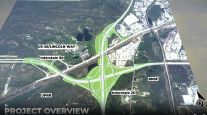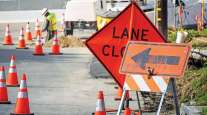West Virginia Gov. Wants to Address Transportation, but Proposed Tax Increases Greeted With Skepticism

Times are grim in West Virginia. So grim that new Gov. Jim Justice, who pledged not to raise taxes as a candidate last year, called in his Feb. 8 State of the State address for new taxes worth about $450 million.
Justice also wants to increase taxes on diesel and gasoline by 10 cents per gallon to deliver $150 million annually to West Virginia’s Department of Transportation to help close an infrastructure funding gap that a blue-ribbon commission pegged at $750 million just for maintenance in 2015.
“If we don’t fully implement this plan or something similar to this, our state’s gonna die,” Justice said in a YouTube video released a week after his speech. “Our state’s gonna constrict to the point that it can’t recover. All the low-hanging fruit is gone. …The plan will not only balance the budget, but it will put us on a path to prosperity. … We’ve got to act now.”
In a report released Feb. 16 by TRIP, a transportation research group, 29% of West Virginia’s roads were in poor condition in 2016, with 55% rated fair. Those figures marked a huge decline from 2004, when TRIP rated just 10% of the roads as poor and 26% as fair. The news was similar with West Virginia’s bridges, 17% of which TRIP termed structurally deficient. That’s the nation’s fifth-highest percentage and worse than 2014, when they were rated 12th-worst with 13% structurally deficient.
“We’re going downhill fast,” Mike Clowser, executive director of the Contractors Association of West Virginia, lamented to Transport Topics. So he is happy that Justice is trying to address infrastructure.
“This is the first time we’ve had a governor talk about transportation in several years,” said Clowser, who pegs WVDOT’s maintenance needs at more like $250 million. “We are pleased that the governor has made this an integral part of his legislative plan. It creates jobs and economic development. It improves safety. It helps tourism. I think if we can get [all the stakeholders] at the table, we’re smart enough to come up with something to maintain our roads before we let 'em go to pieces. We’ve ignored the problems for too long.”
However, Jan Vineyard, president of the West Virginia Trucking Association, isn’t sold on Justice’s approach to trying to fix the state’s infrastructure woes.
“West Virginians were shocked with his plan,” Vineyard said, adding that the $450 million would be the largest tax increase in state history and wasn’t balance by just $26 million in proposed spending cuts.
Vineyard said that Justice’s suggested fuel tax increases will be a difficult sell to the Republican-controlled House and Senate for Democrat Justice, especially because so much of the state is within easy reach of Kentucky, Maryland or Virginia, all of which already have lower or similar fuel-tax rates to West Virginia’s 33.2 cents per gallon on both diesel and gasoline.
“Our members could probably bear the increase [on diesel] since we want better highways,” Vineyard said. “The tough thing is the way we’re positioned geographically. Legislators are very wary about raising fuel taxes and really think that people will cross the borders to buy gas.”
“We had hoped that this governor would live up to his campaign promises of restructuring government and not putting additional tax burdens on our citizens,” Speaker Tim Armstead said in a statement issued after Justice’s State of the State address. “While we want to work with the governor to solve this budget crisis, I do not believe the approach he presented tonight is something this Legislature — or the voters who elected us — will support.”
Vineyard said there is also concern about his proposal to raise tolls on the West Virginia Turnpike to $3 per car from $2 with a proportional increase on Class 8 trucks, which currently pay $6.75. Those are the cash tolls. In-state E-ZPass holders pay $1.30 in cars, $5.40 in trucks.
West Virginia’s Senate overwhelmingly approved a transportation funding bill last March that included a 3 cents-per-gallon fuel-tax increase, but the House killed it by declining even to vote on it.




